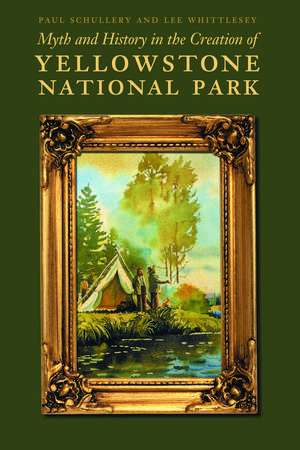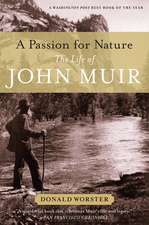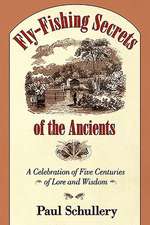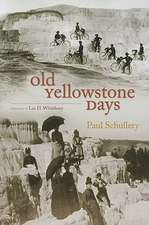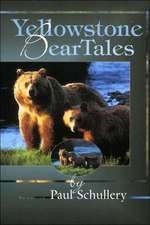Myth and History in the Creation of Yellowstone National Park
Autor Paul Schullery, Lee Whittleseyen Limba Engleză Paperback – 31 dec 2010
Yellowstone National Park, a global icon of conservation and natural beauty, was born at the most improbable of times: the American Gilded Age, when altruism seemed extinct and society’s vision seemed focused solely on greed and growth. Perhaps that is why the park’s “creation myth” recounted how a few saintlike pioneer conservationists labored to set aside this unique wilderness against all odds, when in fact, the establishment of Yellowstone was the result of complex social, scientific, economic, and aesthetic forces. Paul Schullery and Lee Whittlesey, both longtime students of Yellowstone’s complex history, present the first full account of how the fairy-tale origins of the park found universal public acceptance, and of the long process by which the myth was reconsidered and replaced with a more realistic and ultimately more satisfying story.
| Toate formatele și edițiile | Preț | Express |
|---|---|---|
| Paperback (1) | 90.91 lei 3-5 săpt. | |
| BISON BOOKS – 31 dec 2010 | 90.91 lei 3-5 săpt. | |
| Hardback (1) | 161.50 lei 6-8 săpt. | |
| Nebraska – sep 2003 | 161.50 lei 6-8 săpt. |
Preț: 90.91 lei
Nou
Puncte Express: 136
Preț estimativ în valută:
17.40€ • 18.91$ • 14.63£
17.40€ • 18.91$ • 14.63£
Carte disponibilă
Livrare economică 31 martie-14 aprilie
Preluare comenzi: 021 569.72.76
Specificații
ISBN-13: 9780803234734
ISBN-10: 0803234732
Pagini: 146
Ilustrații: 28 illustrations, 1 appendix
Dimensiuni: 152 x 229 x 14 mm
Greutate: 0.23 kg
Editura: BISON BOOKS
Colecția Bison Books
Locul publicării:United States
ISBN-10: 0803234732
Pagini: 146
Ilustrații: 28 illustrations, 1 appendix
Dimensiuni: 152 x 229 x 14 mm
Greutate: 0.23 kg
Editura: BISON BOOKS
Colecția Bison Books
Locul publicării:United States
Notă biografică
Paul Schullery is the author of many books on the American West, including Searching for Yellowstone and Old Yellowstone Days. He wrote and narrated the PBS film Yellowstone: America’s Sacred Wilderness and is currently scholar-in-residence at Montana State University Library. Lee Whittlesey is park historian for the National Park Service at Yellowstone National Park. He is the author of several books, most recently Ho! for Wonderland: Travelers’ Accounts of Yellowstone, 1872–1914 and A Yellowstone Album: A Photographic Celebration of the First National Park.
Cuprins
List of Illustrations
Acknowledgments
Introduction
1. In Camp That Night
2. A Rather Unusual Discussion
3. On the Documentary Trail from Madison Junction
4. Coming to Terms with Nathaniel Langford
5. Altruists and Realists
6. Spreading the Word
7. The Debate
8. It Came Out All Right!
9. Leaving It All Behind
10. Myth and Responsibility
Conclusion: Campfire Lessons
Appendix: Known and Reported Accounts of the Washburn Expedition
Notes
Index
Recenzii
“A gem. . . . One can only hope that this entertaining volume, which is as much mystery as history, will be widely read, enlightening us about both the park and the pitfalls of myths.”—Robert W. Righter, South Dakota History
"The discussion concerning the place of myths, legends, and solid history is thought provoking. For history graduate students it is a case study in how bureaucracy can change over a generation or two, how myths can begin, and how difficult it can be to destroy them."—Richard A. Bartlett, Oregon Historical Quarterly
“This book is valuable because it offers a complex vision of the origins of the national park ideal rather than a simple campfire story, and it is accessible to general readers. It is also an interesting tale of the use, and possible misuse, of history.”—Kathy S. Mason, Register of the Kentucky Historical Society
“A productive and provocative exploration of the connections among national institutions, evolving ideologies, and the symbolic power of stories. It has much to offer to those interested in the social, cultural, and scientific issues that constitute environmental studies today.”—Robert E. Walls, Journal of American Folklore
“A fascinating, courageous, and curious little book.”—Outdoor News Bulletin
“The book should appeal to serious students of Western history and the conservation movement as well as those more philosophically inclined.”—Mark Hertig, Nebraska History
